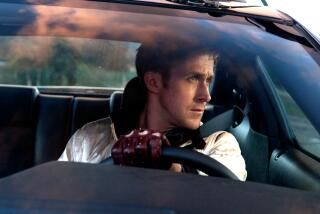What they are saying: ‘Nightcrawler’ captures the noirish edge of L.A.

Howard and Austin Raishbrook, twins who are news “stringers,” served as technical advisors to the new movie “Nightcrawler.” In this 2008 video, they drive the streets of Los Angeles at night looking for newsworthy images.
Sometimes it’s hard to know what looms largest in Los Angeles: The sprawl of the city, the outsized egos of some of its residents or the industries that enable their ambitions.
In the new film “Nightcrawler,” Louis Bloom, played by Jake Gyllenhaal, is a member of Los Angeles’ sizable loner class and its just as substantial population of dreamers, whose members often overlap. A congenital hustler, Bloom steals scrap metal, he steals bikes, he wangles and negotiates and angles for a respectable career.
Inspiration strikes one night in the form of a crash on the freeway. Bloom watches a freelance cameraman film two California Highway Patrol officers freeing a survivor from a burning car. After seeing the footage on the next morning’s news, Bloom gets a camera and becomes the sleaziest ambulance chaser in Los Angeles — sometimes sneaking into homes or moving bodies to get the perfect shot.
“Nightcrawler” is noir as Los Angeles has always done it, stories about private life amid the sun and palm trees that inevitably skid toward darkness.
But the movie is also about Los Angeles TV’s news as entertainment complex, which gets a cinematic contact burn for broadcasting Bloom’s close-ups of victims’ bodies.
“Think of our newscast as a screaming woman running down the street with her throat cut,” says the overnight news producer for the TV station that buys Bloom’s footage.
That is probably the movie’s most-quoted line, and it’s gotten the attention of critics.
“That’s where the farce in this movie is — that Louis is not only able to perform a sick job because he is sick, he’s also capable of thriving in it as a businessman,” film critic Wesley Morris writes on Grantland.
“Viewers who recently booked a vacation in L.A. will come out of the movie and cancel their reservation,” writes the New Yorker’s Anthony Lane.
In the film’s version of life, “where network news is a serial offender against taste, the idea of respect is about as relevant as a sword fight, and there is no such place as offstage,” Lane writes. “There is only appetite, and the ratings spike to be had from sating it. Viewer discretion is a joke.”
There’s something out-of-date about the movie’s line of attack against the folks standing on the broadcast end of the antenna, however — especially given the polyphony of voices that have added noise to our news universe: not just TV stations and newspapers, but bloggers, tweeters and Instagrammers.
The message in “Nightcrawler,” “that the news media feeds a morbid fascination with atrocity,” writes the New York Times’ A.O. Scott, “is hardly implausible, but the target is more than a little shopworn, and the stance of queasy outrage feels secondhand, not to say a bit hypocritical.”
When something goes horribly wrong these days, the real twist is not that somebody like Bloom is racing toward the scene to satisfy his bosses at the TV station, but that some Joe Nobody is already there, taking in the action with a smartphone and broadcasting it to his followers.
More to Read
Start your day right
Sign up for Essential California for news, features and recommendations from the L.A. Times and beyond in your inbox six days a week.
You may occasionally receive promotional content from the Los Angeles Times.







